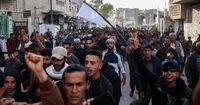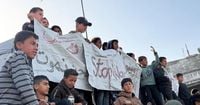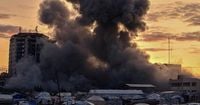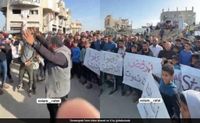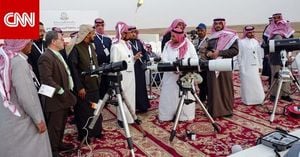In a rare show of dissent, hundreds of Palestinians gathered in northern Gaza on March 25, 2025, to protest against Hamas and demand an end to the ongoing war with Israel. The protest took place in Beit Lahia, where demonstrators were seen shouting anti-Hamas slogans, including calls for the militant group to go "outside." This rally marked the largest public demonstration against Hamas since the outbreak of the current conflict, which has resulted in over 50,000 deaths in the Gaza Strip since October 7, 2023, according to Palestinian health officials.
Videos verified by NBC News captured the atmosphere of the protest, with many participants holding signs that read "We refuse to die" and chanting phrases such as "Hamas out" and "Hamas terrorists." The crowd, primarily composed of men, expressed their exhaustion and frustration with the ongoing violence, with one protester stating, “We don’t want destruction; we don’t want war; we want to live.”
The backdrop of the protest is the devastating humanitarian crisis in Gaza, exacerbated by Israel's military offensive, which was launched in response to the October 7 attacks by Hamas that killed approximately 1,200 Israelis and resulted in 250 hostages being taken. The recent escalation of violence saw Israel resume airstrikes and ground operations after a two-month ceasefire ended on March 1, 2025, leading to the deaths of over 700 Palestinians since then.
Sanam Vakil, director of Chatham House’s Middle East and North Africa Programme, noted the significance of the protests, stating, “The protest really signifies that there is indeed frustration, if not opposition, to Hamas.” While there have been smaller protests in the past, this demonstration reflects a growing discontent among the population, as many express their desire for peace and an end to the conflict.
Despite the apparent outcry against Hamas, the group's leadership has not publicly responded to the protests. However, reports indicate that masked Hamas militants attempted to disperse the crowd, resulting in clashes and the assault of several demonstrators. One protester, who wished to remain anonymous for fear of retribution, remarked, “I took part to send a message on behalf of the people: Enough with the war.”
The political landscape in Gaza is complex, as Hamas has ruled the territory since 2007 after winning elections and subsequently ousting rival factions. The ongoing conflict has led to widespread destruction, with many buildings reduced to rubble, forcing residents to flee repeatedly in search of safety. A witness at the protest lamented, “All Gaza is in ruins and now the occupation ordered us to leave the north again, where to go?”
As protests against Hamas grow, public sentiment appears to be shifting. A poll released in September by the Palestinian Center for Policy and Survey Research indicated that support for Hamas in Gaza had declined to 35%, down from 38% three months prior. This shift in public opinion may reflect the increasing frustration among Gazans, who are caught in the crossfire of a conflict that has brought immense suffering.
In the wake of the protests, calls for further demonstrations circulated on social media platforms, suggesting that the discontent may not be a fleeting moment but rather a sign of deeper unrest. The protests in Beit Lahia were echoed in other areas, including Jabalia refugee camps, where residents burned tires and called for an end to the war. “We want to eat,” they chanted, highlighting the dire humanitarian situation facing many in Gaza.
As the situation remains volatile, questions about the future governance of Gaza loom large. Hamas has signaled a willingness to cede political power to a Palestinian unity government but has insisted on not disarming until an internationally recognized Palestinian state is established. Analysts suggest that Hamas leaders may feel increasingly cornered, unable to meet the demands of both their constituents and external pressures.
Israel's military strategy continues to focus on dismantling Hamas’s leadership and infrastructure, with reports indicating that the Israeli government is prepared to escalate its military operations if the group does not relent. Israeli Prime Minister Benjamin Netanyahu has reiterated that the military campaign aims to ensure Hamas cannot maintain control over Gaza, a stance that has garnered mixed reactions within Israel.
While some Israeli factions support the renewed military action as a means to defeat Hamas, there are concerns about the humanitarian toll and the impact on hostages still held by the group. The ongoing conflict and the protests in Gaza highlight the complex interplay of local and international politics, with the potential for significant ramifications for both Palestinians and Israelis.
As the situation develops, the international community watches closely, with hopes for a resolution that prioritizes the well-being of civilians caught in the conflict. The protests may represent a pivotal moment for Palestinians in Gaza, signaling a desire for change amidst the chaos of war.

